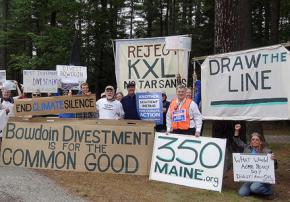Drawing the line on Keystone
and report on protests against the Keystone pipeline.
URGING the Obama administration to "Draw the Line," protesters gathered in dozens of cities across the U.S. on September 21 to demand a halt to the Keystone XL pipeline--and real action on climate change.
Organized by the environmental group 350.org, the protests are part of growing actions by environmental groups to halt production on the Keystone XL pipeline, a project that environmentalists say has the potential to devastate local communities where hydraulic fracturing takes place--and the communities through which the products of fracking are shipped.
The protests were intended to mark the five-year anniversary of TransCanada Corp. first seeking approval for the 1,180-mile pipeline. Speaking about the demonstrations last week, 350.org founder Bill McKibben told Democracy Now's Amy Goodman:
I think what's going on is the fight is sharpening...People are getting engaged and the fight over the Keystone pipeline is a good example. When we started this two years ago, everybody had said, it is a done deal, you've got no chance. But people all over the country stood up...[O]ne of the points we're making is, look, if you're worried about putting a red line against the deadly gas, this is one case where we can do it without dropping a missile on anybody. All we need to do is stand up to this pipeline, and it's within the power of the president to do it all by himself.

In Seattle, more than 1,000 people rallied on September 21 against coal exports, the Keystone XL Pipeline and the Trans-Pacific Partnership (TPP) treaty. Sponsored locally by 350.org, the Sierra Club, the Washington Fair Trade Coalition and others, the rally was addressed by 350.org's McKibben.
Before the rally, educational workshops were held on several topics related to fossil fuel exports. The organizers urged people to come to upcoming hearings on proposed coal exports in Washington state on October 17 in Tacoma and October 23 in Seattle.
The workshop on the TPP was especially alarming. Congress is now debating fast-track (or "trade promotion") authority, which would allow it to pass the TPP without any amendments on a straight up or down vote.
TPP covers 11 countries and would grant corporations the right to sue governments to prevent environmental, labor or food safety legislation if the law would interfere with profits. The cases would be decided outside of the regular court system, in special trade courts staffed by corporate representatives.
Similar rules have already invalidated important laws under the North American Free Trade Agreement. For example, a law requiring labeling of "dolphin-safe" tuna in the U.S. was thrown out, and in Canada, a U.S. corporation prevented the implementation of a law against a particularly destructive gasoline additive.
If TPP is passed, environmental activists anticipate that corporations would use it to mandate coal and gas exports. Stopping the TPP is, therefore, a central part of the fight to prevent exports of fossil fuels.
Organizers urged people to contact their congressional representatives and go to hearings, but also to be prepared for civil disobedience. Already, activists have blocked train tracks near Bellingham, Wash., to protest a proposed coal port there. This is part of a wave of direct action across the U.S. and in Canada against the Keystone XL pipeline and other energy projects.
At the end of the demonstration, Bill McKibben called for an increase in movement activism: "We are up against the most powerful enemy ever--the fossil fuel industry. We have to take them on at every turn. We can stop the coal trains from coming through Seattle. There aren't enough police to keep the tracks clear. They said they would have a permit for the Keystone XL by 2011. We have stopped them so far!"
Burlington, Vt., also hosted one of the 200 "Draw the Line" demonstrations scheduled across the country. The demonstration of 70 activists was organized by a student group from the University of Vermont's (UVM) Student Climate Culture, which is leading the campaign at UVM calling for the university's endowment to be divested from fossil fuels.
The protest began with a mock pro-pipeline news conference, after which the spokesmen attempted to march a 20-foot-long "pipeline" down the city center. They were met by students and community activists, stopping the "pipeline" in its tracks.
The theatrics were followed with a speak-out, where activists spoke about the devastation that the tar sands fuel and the pipeline would cause; the call for institutions to divest form fossil fuels; and a local pipeline being proposed to run fracked gas through our communities and even under Lake Champlain to fuel a paper factory in New York.
Josh Gachette, a student activist who began the speak-out, said that this national day of action is "indicative of a coming consciousness, a rising tide of awareness"--but that the campaigns in Burlington lacked "awareness of a global perspective."
Another student organizing for fossil fuel divestment at UVM, Blair Rancich, thought that it was helpful that divestment activists were also organizing against the Keystone XL pipeline. If environmentalists succeed in getting the school to divest from fossil fuels however, they will "need to become more radical."
According to Blair, "The Board of Trustees has been very sluggish. We will need sit-ins, we will need to obstruct the functions of the school like they did in the struggle to divest from South Africa. Otherwise, the board of trustees will try to wait the 'kids' out so they won't have to do anything."
A small group of students went from the "Draw The Line" action as it ended to another demonstration in town called "Racism Kills Dreams," in order to support the fight against racism in Burlington and to attempt to connect the different struggles in our town.


